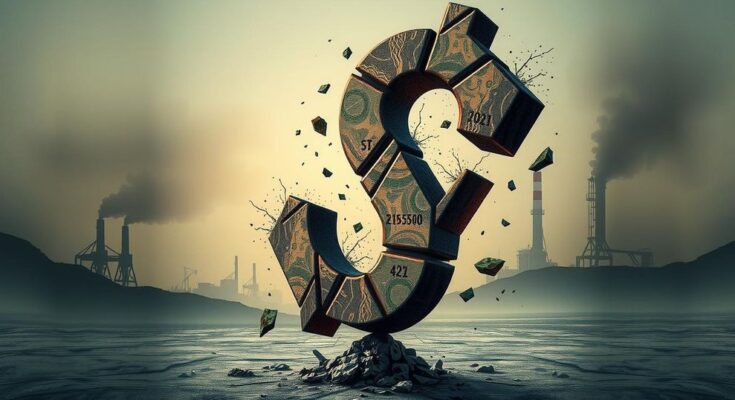Iran is experiencing an economic crisis marked by soaring inflation, a collapsing currency, and increasing poverty due to U.S. sanctions reinstated by President Donald Trump. Food and housing prices are out of control, contributing to widespread dissatisfaction. With the oil sector under immense pressure and a currency in freefall, Tehran faces difficult choices regarding its economic management and potential negotiations with the U.S.
Iran is currently facing a grave economic crisis characterized by skyrocketing inflation, a nosediving currency, and mounting poverty that threatens to plunge millions into despair. The situation has worsened since U.S. President Donald Trump reinstated his stringent sanctions policy, aiming to choke Iran’s economy further. Newsweek has sought comments from Iran’s Foreign Ministry regarding these developments.
Prices for basic necessities such as food and housing have surged dramatically, creating widespread discontent. Current inflation rates exceed 45 percent, and reports indicate that nearly half of Iran’s population now lives in poverty, as stated by the Statistical Centre of Iran. The Iranian government’s response to this growing discontent is becoming increasingly urgent.
Under Trump’s administration, the U.S. has reimposed sanctions specifically designed to dismantle Iran’s economic framework, and the repercussions are becoming evident. Despite Trump’s attempts to open dialogues for negotiation, he continues to threaten additional pressure regarding Iran’s nuclear capabilities. Afshin Molavi, a Senior Fellow at the Foreign Policy Institute, noted the severe impact of mismanagement and corruption on the economy exacerbated by these sanctions.
Iran’s currency recently plummeted to an unprecedented low of 928,000 rials per dollar, marking a more than 6 percent drop in just one day. This significant devaluation has worsened inflation rates, diminishing savings and rendering imported goods prohibitively expensive for many Iranians.
Housing costs in the capital city, Tehran, have soared 24-fold over the last 12 years, while real estate prices have increased by over 37 times. Wages have only improved about 20-fold, leading many individuals to find it impossible to afford decent living conditions as rents can exceed entire monthly salaries in some districts.
The oil sector, vital to Iran’s economic stability, faces severe challenges due to U.S. sanctions. In a recent directive, Trump reaffirmed his commitment to eliminate Iran’s oil exports entirely, a decision that significantly threatens Tehran’s economic health, given that oil revenues constitute roughly 40 percent of government income.
Although expressing a willingness to negotiate, Trump issued a stern warning regarding Iran’s nuclear ambitions, stating, “They cannot have one thing—they cannot have a nuclear weapon. And if I believe they are pursuing one… it will be very unfortunate for them.”
Comments from Iranian officials reveal that the current economic trials surpass the government’s control, with President Masoud Pezeshkian stating, “The current economic challenges are beyond the government’s immediate control, and we are exploring all possible avenues to mitigate the impact on our citizens.”
Meanwhile, Trump remarked on Tehran’s state of mind, asserting, “Iran is very nervous. I think they’re scared. I think Iran would love to make a deal and I would love to make a deal with them without bombing them.” Afshin Molavi attributed the crisis primarily to internal failures, declaring, “This is a crisis mostly of its own making.”
As economic instability continues to mount, Iran’s government must make crucial decisions moving forward. The choices include diplomacy, economic reforms, or a tougher stance against the U.S. In the meantime, the Iranian populace is left to ponder how much worse their situation may become.
The Iranian economy remains under severe strain due to a combination of external sanctions and internal mismanagement. With the population facing unprecedented inflation and widespread poverty, the government is compelled to respond. Given the critical nature of these challenges and mounting public pressure, Tehran’s forthcoming decisions will be pivotal in determining the country’s socio-economic future.
Original Source: www.newsweek.com




